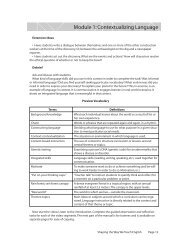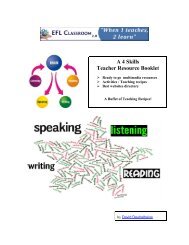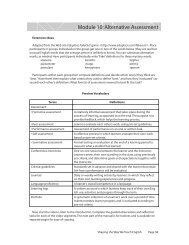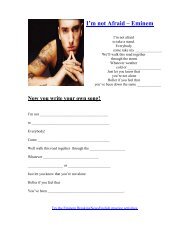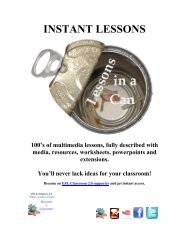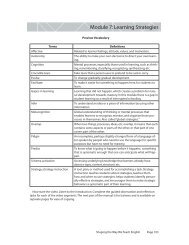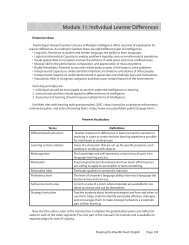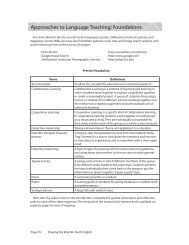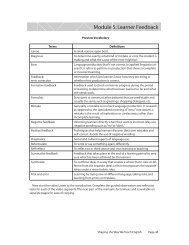Ten Audience Analysis Exercises - EFL Classroom 2.0
Ten Audience Analysis Exercises - EFL Classroom 2.0
Ten Audience Analysis Exercises - EFL Classroom 2.0
You also want an ePaper? Increase the reach of your titles
YUMPU automatically turns print PDFs into web optimized ePapers that Google loves.
7. Changing Places. Every place has things that change--sometimes as the result of<br />
economics, sometimes because different people are involved, and sometimes for<br />
no clear reason that you know about. Think of a change to a place that you know<br />
well. Perhaps the local grocery store you grew up with as Smith and Bros.<br />
Grocery was bought out by a regional chain like Food Lion or Winn Dixie.<br />
Maybe the First National Bank of Smithburg suddenly becomes NationsBank.<br />
Perhaps the change was more personal--an older sibling moves out of the house<br />
and your family changes the room to a guest room or an office. Think of a<br />
specific change and narrate the events that occurred. Readers should know the<br />
details of the change, and they should know how you feel about the changes that<br />
occurred.<br />
8. Personal Rituals. Describe a personal ritual that you, your friends, or your family<br />
have. Think about the personal steps that you always go through when you<br />
prepare for an exam. Do you sit at a desk, spread books and notes across your bed,<br />
or use the kitchen table? Do you have to have something to drink...soda, water,<br />
jolt? There are numerous things that we do for which we create our own personal<br />
rituals. Choose one event--studying for a test, writing a paper, dressing and<br />
warming up before a game, or preparing and having a special family meal.<br />
Narrate the events that take place when you complete your ritual so that your<br />
readers understand the steps that the ritual includes and why you complete them.<br />
9. Standing Up. Choose a time when you did something that took a lot of nerve, a<br />
time when you didn't follow the crowd or a time when you stood up for your<br />
beliefs. Perhaps your friends were urging you to do something that you were<br />
uncomfortable with and you chose not to cave into peer pressure. Maybe you took<br />
a stance on a political issue that was important in your community, or you might<br />
have Whatever you choose, think about the details of the event and write a story<br />
that tells about what happened. Your narrative should show your readers why you<br />
decided to make a stand or try something that took nerve, give specifics on the<br />
events, and share how you felt after the event.<br />
10. Disagreeing. Think of a time when you disagreed with a decision that had been<br />
made and did something about it. The decision might have been made by<br />
someone you know personally--your Biology teacher announced a new policy to<br />
grade for spelling and grammar on your quizzes and homework, or an older<br />
family member decides to cancel a subscription to a magazine that you liked to<br />
read. You might have responded by discussing your concerns with your principal<br />
or dean, or you might have decided to get a part-time job to earn enough money to<br />
buy the magazine yourself. Or the decision could have been made by someone



